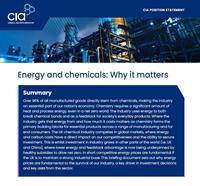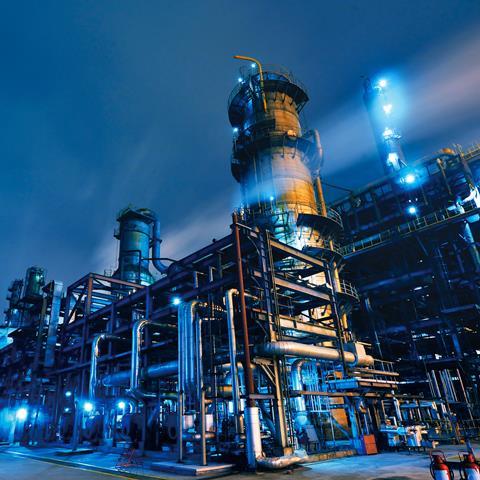Explore this page: Energy prices in the UK | Why do electricity prices remain uncompetitive in the UK? | What further measures could be taken now to reduce the disparity in energy prices? | CIA asks | What actions has industry taken to reduce its energy consumption? | How does the energy transition impact the chemical industry and wider UK net zero target? | Is natural gas important for the chemicals sector in transitioning to a net zero world? | What is the role of the chemicals sector in the energy transition to net zero?
This briefing document sets out why energy prices are fundamental to the survival of our industry, a key driver in investment decisions and key asks from the sector.
Download full document
Over 96% of all manufactured goods directly stem from chemicals, making the industry an essential part of our nation’s economy. Chemistry requires a significant amount of heat and process energy, even in a net zero world. The industry uses energy to both break chemical bonds and as a feedstock for society’s everyday products. Where the industry gets that energy from and how much it costs matters as chemistry forms the primary building blocks for essential products across a range of manufacturing and for end consumers.
The UK chemical industry competes in global markets, where energy and carbon costs have a direct impact on our competitiveness and the ability to secure investment. This is whilst investment in industry grows in other parts of the world (i.e. US and China), where lower energy and feedstock advantage is now being underpinned by healthy subsidies to drive net zero. In short competitive energy prices are fundamental if the UK is to maintain a strong industrial base. This briefing document sets out why energy prices are fundamental to the survival of our industry, a key driver in investment decisions and key asks from the sector.
Why are energy prices high in the UK?
Over the last 5 years global gas prices have increased significantly often with periods of extreme price volatility. This pronounced change is due to a combination of international decarbonisation policies disincentivising the use of coal and oil, international economies rapidly rebounding after the Covid pandemic, and the invasion of Ukraine leading to subsequent loss of pipeline gas supplies into Europe from Russia’s Nordstream 1 and 2. As a net importer of natural gas for feedstock, heat energy and power generation, the UK is increasingly exposed to global markets. If the UK cannot compete on price, it cannot secure the imports necessary to meet daily, seasonal, and peak demands with the potential for curtailment measures designed to ration energy and protect security of supply. Gas prices significantly impact the wholesale price of electricity in the UK as it is both a baseload and marginal fuel used for power generation. Peaks in demand for gas have a knock-on impact on power prices, which, coupled with periods of low renewable outputs from wind and solar create very significant cost spikes for UK consumers.
During the energy crisis the UK Government, like many international governments, stepped in to support consumers by capping and subsidising wholesale gas and electricity prices that would otherwise severely impact energy affordability for domestic consumers and businesses and significantly increasing inflationary pressures on goods and services.
Since winter 23/24, wholesale prices have substantially reduced with gas trading around £1.00 per therm. However, UK electricity prices remain significantly above competing nations given UK policy has prioritised the decarbonisation of power generation in its efforts to reduce our impact on climate change. Although successful, the strategy to pursue clean power generation has resulted in significant subsidies which under current policy, are recovered from consumers in the form of electricity policy levies. Furthermore, our departure from coal fired generation, to offshore wind and onshore solar has necessitated significant reinvestment in transmission and distribution systems to enable renewable power to be directed to consumers around the UK.
If wholesale gas prices have reduced, why do electricity prices remain uncompetitive in the UK?
The power price disparity is caused by several underlying factors: wholesale prices, balancing costs, network costs, environmental/social policy costs and the UK only ‘Carbon Price Support’ mechanism. All these costs are influenced to some extent by national policies, but also how these are recovered from specific end user types. As illustrated below, the non-wholesale cost element can account for almost a third of the UK’s power price for electro intensive industries such as chemicals. The UK Government Super Charger Package goes some way to reduce the electricity price disparity for some EII’s but the relief is neither a benefit nor subsidy, it is an essential intervention for UK companies to be able to compete. This intervention is currently available to some 12 of the chemical companies of the ~4,400 UK chemical businesses remaining fully exposed to high power costs. Even with this package, our sector faces higher electricity prices opposite much of Europe (~40-60% disparity).
power price disparity is caused by several underlying factors: wholesale prices, balancing costs, network costs, environmental/social policy costs and the UK only ‘Carbon Price Support’ mechanism. All these costs are influenced to some extent by national policies, but also how these are recovered from specific end user types. As illustrated below, the non-wholesale cost element can account for almost a third of the UK’s power price for electro intensive industries such as chemicals. The UK Government Super Charger Package goes some way to reduce the electricity price disparity for some Energy Intensive Industries (EIIs) but the relief is neither a benefit nor subsidy, it is an essential intervention for UK companies to be able to compete. This intervention is currently available to some 12 of the chemical companies of the ~4,400 UK chemical businesses remaining fully exposed to high power costs. Even with this package, our sector faces higher electricity prices opposite much of Europe (~40-60% disparity).
What further measures could be taken now to reduce the disparity in energy prices?
In the short term, and with immediate effect, abolish the UK specific Carbon Price Support (CPS) mechanism which has led to one of the world’s highest combined carbon prices for the power generation sector. This is a cost which is passed through in electricity bills to all GB consumers.
CPS is now an unnecessary policy measure. It was originally designed to supplement a weak EU Emissions Trading Systems (ETS) price signal which was otherwise failing to drive coal out of the power generation mix. The UK has now achieved this2. Furthermore, the market based carbon price signal is now sufficiently high to be effective in driving decarbonisation without supplementary support and the UK is now fully in control of its carbon framework under the UK ETS. So long as the CPS remains it inflates UK industrial electricity prices where gas is the input fuel, and directly impacts gas users who face competition in the EU.
Looking ahead, whilst gas remains both a marginal and baseline fuel for power generation, we ask UK government to ensure that:
- A more holistic cross energy view needs to be rapidly developed by the NESO, Ofgem energy policy makers and Department for Energy Security and Net Zero (DESNZ). Our gas networks have a 200+ year history, and it remains one of the most concentrated forms of energy use globally. The embedded investment, sunk and ongoing level of depreciation and our future utilisation of the networks as a carrier for methane natural gas, hydrogen or blends thereof requires considerable economic and social planning and direction to avoid otherwise unnecessary costs for both gas and power consumers.
- Strategic planning of renewable electricity deployment needs to occur considering the location and type of renewables such as wind and solar, whilst also factoring in the associated costs of networks investment, capacity constraints and balancing costs. This holistic view, and joined up approach to investment planning is a key role that must be delivered by the new National Energy System Operator if the UK is to deliver net zero at the lowest cost for consumers and remain internationally competitive.
- Proposed reforms of Electricity Arrangements, deliver outcomes that are both fair and consistent with key net zero transition pathways, ensure security of supply and critically, deliver GB wholesale electricity and balancing costs that are competitive relative to other nations.
- Competition is developed between network companies who at present have geographical monopolies, and Ofgem deliver a fairer balance between investor returns and consumers. Whilst the electrification of heat and transport will require a significant investment and expansion of our electricity transmission and distribution networks, GB network costs are already disproportionately high relative to many other nations. This is further compounded by the GB charging frameworks being at odds with many European nations.
What actions has industry taken to reduce its energy consumption?
In the earlier years, the sector has made significant progress to reduce its consumption through both energy and resource efficiency efforts. More recently data collected via climate change agreement reporting alone demonstrates an 18% energy efficiency improvement since 2008. However much of the low hanging fruit has been exhausted and access to alternative and affordable energy and raw material sources are much needed. Currently much of our energy and raw materials comes from oil and gas. In a net zero world the industry will need to be powered by clean electricity and low carbon hydrogen. In parallel, alternative sources of raw materials derived from waste, captured carbon, hydrogen and biomass will all have a role to play to deliver more sustainable materials.
How does the energy transition impact the chemical industry and wider UK net zero target?
The drive to increase both the supply and access to clean, renewable energy is fundamental to net zero especially for a sector where energy is a significant proportion of its operational costs and one that competes on global markets.
Furthermore, the energy transition must be achieved at the lowest possible cost. Furthermore, the chemical sector is the largest industrial energy consumer, largely because around half of the sectors energy input is consumed as
feedstock . This is fuel used as a raw material input rather than as a source of energy to make the everyday products for the rest of manufacturing and wider society. The real challenge remains in minimising the need for oil and gas based feedstock and switching to alternative feedstocks where it is commercially and economically viable to do
so, whilst recognising that in the short term gas will continue to play a key role in delivering the key building blocks needed for the UK’s, manufacturing economy.
Is natural gas important for the chemicals sector in transitioning to a net zero world?
Gas as a cleaner, lower carbon form of fossil fuel, is the primary form of heat energy for UK consumers whether they’re industrial, commercial or domestic. In addition to heat, gas is used to generate around 50% of our annual electricity supplies each year, and at times of peak electricity demand, and depending on the availability of wind and solar, as much as 80%. Although the demand for gas will inevitability decline on our path to net zero, its role will remain essential to (i) mitigate the intermittency of wind and solar generation and (ii) as our principal source of blue hydrogen until the we have sufficient renewable electricity to create electrolysis derived hydrogen (green) and (iii) as
a methane feedstock until viable alternatives are available to derive essential chemical building blocks. Consequently, the UK must continue to ensure it has access to competitive, affordable, secure supplies of gas.
What is the role of the chemicals sector in the energy transition to net zero?
All manufactured products rely on chemicals, and therefore chemistry is essential in combating climate change. The sector is a provider of key materials for the UK’s energy transition, whether it be composites for wind turbines, acetyls for solar panels or silicone elastomers to help improve battery capacity or providing high voltage cable insulation.
It also enables other sectors to reach net zero, from enabling captured CO2 and green hydrogen to be converted into sustainable aviation fuel or the development of new asthma inhaler propellant with a much lower GHG footprint. Finally, parts of the sector also play a critical role in energy resilience working with the sector to help balance supply and demand in the UK. Simply put, there is no net zero without the chemicals sector and its supply chains, many of which are homegrown in the UK.

Energy and Chemicals: Why it matters
Download this document to see full statement and graphs.
DOWNLOADPDF | 3.36 Mb















